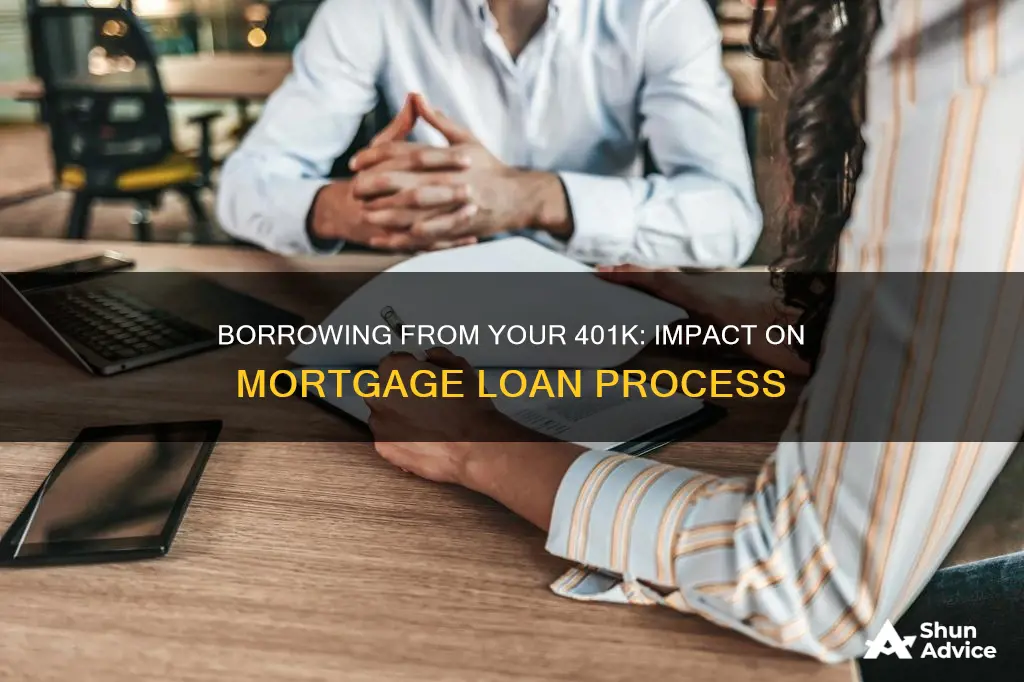
Borrowing from your 401(k) for a down payment has its advantages and disadvantages. While it can provide immediate funds to cover the down payment or closing costs for a home, it also comes with the potential downside of falling behind on your retirement savings. In most cases, you will have to repay the loan within five years, with interest, and you won't be able to contribute additional funds to your 401(k) until the loan is paid off. Borrowing from your 401(k) won't hurt your credit score or affect your ability to qualify for a mortgage, but it's important to consider the potential tax implications and the opportunity cost of losing potential investment gains.
| Characteristics | Values |
|---|---|
| Borrowing from 401(k) vs IRA | You can borrow from a 401(k) but not an IRA |
| Downsides | Interrupting the potential for funds to grow through tax-deferred compounding, making it harder to reach retirement goals |
| Upsides | No taxes and fees, unlike withdrawals; doesn't count towards debt-to-income ratio (DTI) or impact credit score; attractive interest rates |
| Loan cap | $50,000 or 50% of the vested account balance, whichever is less |
| FHA loans | Require mortgage insurance for the life of the loan or for 11 years if a 10% down payment is made |
| PMI | Borrowing from 401(k) can help skip private mortgage insurance (PMI) if it gets the borrower to the 20% threshold |
What You'll Learn

Borrowing from a 401(k) plan for a down payment: pros and cons
Borrowing from your 401(k) plan for a down payment can be a double-edged sword. While it offers quick access to funds, it also comes with potential drawbacks that could impact your financial future. Here are some pros and cons to consider before making a decision:
Pros of Borrowing from a 401(k) Plan for a Down Payment:
- Quick Access to Funds: Borrowing from your 401(k) plan can provide you with quick access to funds for a down payment. This can be especially useful if you are in a financial crunch and need funds urgently.
- No Credit Check: When you borrow from your 401(k), there is no credit check involved. This means that you can bypass the potential hurdles of a traditional loan application process.
- Interest Paid to Yourself: With a 401(k) loan, the interest you pay goes back into your own retirement account, instead of to a bank. This can be seen as paying interest to yourself, potentially increasing your retirement savings in the long run.
- No Impact on Mortgage Application: Borrowing from your 401(k) plan typically does not affect your mortgage application process. Lenders do not consider this type of loan as additional debt when evaluating your mortgage application.
Cons of Borrowing from a 401(k) Plan for a Down Payment:
- Loss of Tax Advantages: When you borrow from your 401(k), you lose the tax advantages associated with retirement savings. The money you repay to your 401(k) is after-tax money, and you may have to pay income taxes on the disbursed amount if you leave your job and cannot repay the loan promptly.
- Early Withdrawal Penalty: If you fail to repay the loan within the specified time frame, you may be subject to an early withdrawal penalty of 10% if you are under 59 1/2 years old. This penalty is in addition to any income taxes owed on the disbursed amount.
- Jeopardizing Retirement Goals: Borrowing from your 401(k) means taking money away from its intended purpose of funding your retirement. You miss out on potential investment growth and compound returns, which can impact your retirement savings significantly over time.
- Repayment Challenges: If you leave your job, you may be required to repay the loan within a short period, often by the due date of your federal income tax return. Failure to do so can result in the loan being considered a withdrawal, triggering taxes and penalties. Additionally, some 401(k) plans require immediate repayment upon termination or do not allow contributions while the loan is outstanding, further impacting your retirement savings.
- Limited Loan Availability: Not all 401(k) plans offer loan options, and even if they do, there are limits set by the IRS. Currently, you can borrow up to 50% of your vested account balance or $50,000, whichever is less.
Best Buy Loaner Phones: What's the Deal?
You may want to see also

How does a 401(k) loan work?
Borrowing from your 401(k) for a down payment can be a financially savvy move as it doesn't attract the taxes and fees that a withdrawal does. However, it's important to understand how a 401(k) loan works before making a decision.
A 401(k) loan is when you borrow money from your own retirement savings account. This means there is no third-party lender involved, and your loan payments, including interest, go directly back into your 401(k) account. The interest rate for a 401(k) loan is often lower than other financing options, and the interest paid benefits the borrower by boosting their retirement savings.
The amount you can borrow from your 401(k) depends on your employer's plan. Generally, you can borrow up to 50% of your vested account balance or $50,000, whichever is less. Some exceptions apply, such as borrowing up to $10,000 if 50% of the vested account balance is less than that amount.
The loan repayment period is typically five years, and automatic deductions from your paycheck make repayment convenient. Most plans also allow early repayment without penalties. It's important to note that you may need your spouse or domestic partner's consent to take out a 401(k) loan.
While a 401(k) loan has benefits, there are also considerations. For example, if you don't repay the loan as agreed, any unpaid amounts become a plan distribution, and you may have to include any previously untaxed amount in your gross income for that year. Additionally, some plans may require full repayment of the loan if you leave your job.
BigCommerce Capital Loans: What You Need to Know
You may want to see also

Alternatives to a 401(k) loan
Borrowing from your 401(k) account can be a tempting option, especially if you are trying to come up with money for a down payment on a new home. However, it is generally recommended only as a last resort. Here are some alternative options to consider:
Individual Retirement Account (IRA)
If you have an IRA, consider using this as a source of funding before turning to your 401(k). IRAs are designed with special provisions for first-time home buyers, allowing them to withdraw up to $10,000 without incurring a penalty. With a traditional IRA, you can take advantage of the first-time homebuyer exemption and avoid the extra 10% early distribution tax.
Federal Housing Administration (FHA) Loan
An FHA loan is a government-backed mortgage loan that can be a great option for first-time home buyers. FHA lenders typically have more flexible borrower qualifications, including low down payment options and more relaxed credit score requirements. The minimum down payment for an FHA loan is 3.5% if your credit score is 580 or higher, and 10% if your score is between 500 and 579.
Department of Veterans Affairs (VA) Loan
If you are a veteran, eligible service member, or surviving spouse, you may qualify for a VA loan. Like FHA loans, VA loans are government-backed and offer lower interest rates and more flexible terms. One of the biggest advantages of VA loans is that they do not require a down payment.
Down Payment Assistance (DPA) Programs
If you have low to moderate income, you may be eligible for a DPA program. These programs provide money or special loans to help with down payments and closing costs.
Gifts from Family and Friends
Depending on your loan program, you may be able to use gift money from family and friends for your down payment. For example, Fannie Mae allows gift funds from immediate family members, fiancés, or domestic partners, while the Federal Housing Administration accepts gifts from a broader range of sources, including family members, employers, close friends, and charitable organizations.
Before making any decisions, it is recommended to consult with a mortgage specialist to explore all your options and find the best solution for your specific circumstances.
Binghamton University's Perkins Loan Participation Explained
You may want to see also

Risks of borrowing from a 401(k) plan
Borrowing from a 401(k) plan can be a risky move, with several potential disadvantages and pitfalls to be aware of. Firstly, you are dipping into your retirement savings, which can negatively impact your future financial security. This is the most obvious downside, as you are depleting the money you have saved and invested for your retirement years. Even if you repay the loan, the money has less time to grow and benefit from tax-deferred compounding, which could make it challenging to reach your retirement goals.
Secondly, there are tax implications. While a 401(k) loan does not incur the same taxes and fees as a withdrawal, the repayment is made with after-tax dollars, leading to double taxation. This means that your earnings are taxed twice, first when you receive your salary and again when you repay the loan, impacting the overall cost of the loan.
Thirdly, there are limits to how much you can borrow. The maximum loan amount is typically $50,000 or 50% of your vested account balance, whichever is less. This restriction may hinder your plans if you require a more substantial sum. Furthermore, the availability of a 401(k) loan depends on your employer and their plan. Not all companies offer this option, and you may need to seek alternative funding sources.
Another risk to consider is the impact on your loan repayment timeline if you leave your job. Should you change jobs, quit, or get fired, the repayment terms may become more stringent, and you may have to repay the outstanding balance much sooner than expected. This could create financial strain and even lead to default if you are unprepared.
Lastly, borrowing from your 401(k) plan may result in missed investment opportunities. When you take out a loan, the specified investment accounts are liquidated for the loan duration, causing you to lose any positive earnings those investments would have generated. While you avoid further investment losses on this money, you also miss out on potential gains.
Boost Mobile Loan Program: What You Need to Know
You may want to see also

Tax implications of 401(k) withdrawals
Borrowing from your 401(k) for a down payment can impact the loan process, as it may reduce the amount of money you can borrow. This is because a 401(k) loan can affect your debt-to-income ratio, which lenders consider when evaluating your loan application. Additionally, a 401(k) loan may not be the best option for a down payment, as it can impact your long-term financial goals and retirement savings.
Now, here is some detailed information on the tax implications of 401(k) withdrawals:
The tax implications of withdrawing from your 401(k) depend on several factors, including the type of 401(k) plan you have, your age, and the reason for the withdrawal. Here are some key points to consider:
- Traditional 401(k) plans are typically funded with pre-tax dollars, which means you will owe income taxes on the withdrawals at the time of withdrawal, based on your tax bracket at that time.
- If you withdraw funds from a traditional 401(k) before reaching the age of 59½, you will likely face a 10% early withdrawal penalty in addition to regular income tax on the withdrawn amount. However, there are some exceptions to this penalty, such as an emergency withdrawal of up to $1,000, if permitted by your plan.
- Roth 401(k) plans are funded with after-tax dollars, so you won't owe any taxes on withdrawals made during retirement.
- When you take a distribution from your 401(k), your retirement plan will provide you with a Form 1099-R, which outlines the total amount withdrawn and any federal and state taxes withheld.
- If you are rolling over your 401(k) funds into a new retirement plan, such as an Individual Retirement Account (IRA), ensure it is done through a direct rollover to avoid immediate tax implications.
- There are strategies to minimise or delay taxes on 401(k) withdrawals, such as careful withdrawal timing, utilising Roth conversions, and managing overall income.
- It is important to consult a qualified tax professional to understand the specific tax implications of your 401(k) withdrawals based on your unique circumstances.
Beto's College Loans: What Does He Owe?
You may want to see also
Frequently asked questions
Borrowing from your 401k for a down payment doesn't hurt the loan process as the lender doesn't care about this type of loan. However, it does have its downsides. For example, you may have to pay a 10% penalty in addition to income taxes on the money disbursed if you can't pay it back.
Borrowing from your 401k means that money is no longer growing tax-free. You will have to pay the loan back with interest, and the time spent paying it back is time that could have been spent growing the money in your account. You may also have to pay an additional 10% tax on the taxable distribution.
Yes, you could consider a Federal Housing Administration (FHA) loan, which is a government-backed mortgage loan that can make it easier for first-time home buyers to achieve homeownership. You could also look into a Department of Veterans Affairs (VA) loan if you are an eligible service member, veteran, or surviving spouse.







